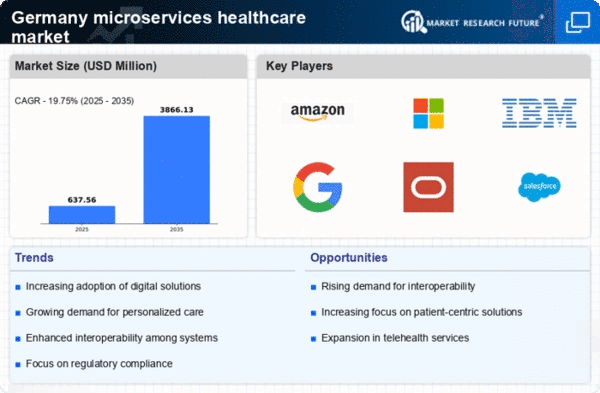Shift Towards Value-Based Care
The microservices healthcare market is increasingly influenced by the shift towards value-based care in Germany. This model emphasizes patient outcomes and cost-effectiveness rather than the volume of services provided. As healthcare providers seek to improve care quality while managing costs, microservices architectures offer the flexibility and scalability needed to implement value-based care initiatives. Reports indicate that healthcare organizations adopting value-based care models have seen a reduction in costs by up to 20%. This trend is expected to drive further investment in microservices solutions, as they enable providers to track patient outcomes and optimize resource allocation effectively.
Rising Demand for Interoperability
Interoperability remains a critical driver in the microservices healthcare market, particularly in Germany, where healthcare systems are often fragmented. The need for seamless data exchange among various healthcare providers is paramount for improving patient care and operational efficiency. Microservices architectures facilitate this interoperability by allowing different systems to communicate effectively. According to recent studies, approximately 70% of healthcare organizations in Germany are prioritizing interoperability initiatives. This trend is likely to accelerate the adoption of microservices solutions, as stakeholders recognize the potential for enhanced collaboration and data sharing, ultimately leading to better patient outcomes.
Increased Focus on Data Security and Privacy
Data security and privacy concerns are paramount in the microservices healthcare market, particularly in Germany, where stringent data protection regulations are in place. The implementation of the General Data Protection Regulation (GDPR) has heightened awareness among healthcare providers regarding the importance of safeguarding patient information. As a result, there is a growing demand for microservices solutions that incorporate robust security measures. Healthcare organizations are increasingly investing in technologies that ensure compliance with data protection laws while enabling efficient data sharing. This focus on security is likely to drive the adoption of microservices architectures, as they offer enhanced security features and the ability to manage sensitive data effectively.
Growing Investment in Health IT Infrastructure
Investment in health IT infrastructure is a significant driver of the microservices healthcare market in Germany. As healthcare organizations recognize the importance of modernizing their IT systems, there is a marked increase in funding for digital transformation initiatives. In 2025, it is estimated that health IT spending in Germany will reach €10 billion, with a substantial portion allocated to microservices-based solutions. This investment is crucial for enhancing operational efficiency, improving patient engagement, and ensuring compliance with regulatory standards. Consequently, the microservices healthcare market is poised for substantial growth as organizations seek to leverage advanced technologies to meet evolving healthcare demands.
Regulatory Support for Digital Health Solutions
The microservices healthcare market in Germany benefits from robust regulatory frameworks that encourage the adoption of digital health solutions. The German government has implemented policies that promote the integration of innovative technologies in healthcare, such as the Digital Healthcare Act. This legislation facilitates the reimbursement of digital health applications, thereby incentivizing healthcare providers to adopt microservices architectures. As a result, the market is projected to grow at a CAGR of approximately 15% over the next five years. This regulatory support not only enhances the operational efficiency of healthcare providers but also improves patient outcomes, making the microservices healthcare market increasingly attractive to investors and stakeholders.
















